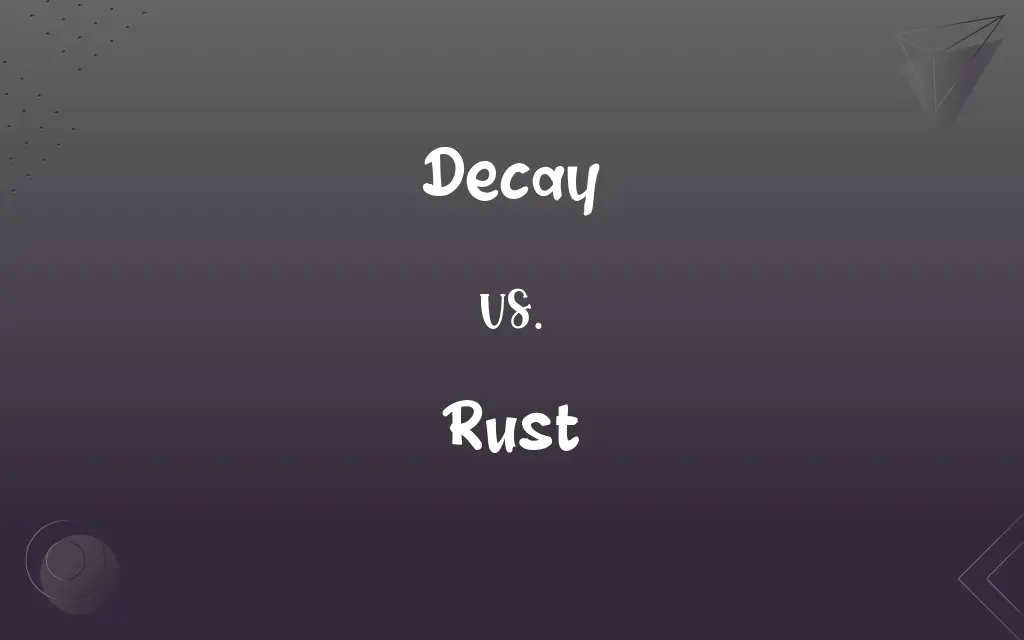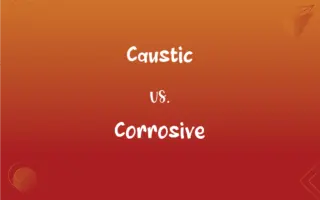Decay vs. Rust: What's the Difference?
Edited by Janet White || By Harlon Moss || Updated on November 6, 2023
Decay is the biological degradation of organic material, while rust is the chemical oxidation of iron and its alloys.

Key Differences
Decay refers to the breakdown of organic substances by biological processes, often involving microorganisms. It's a natural process that can result in the decomposition of living or once-living materials like wood, food, and other biological matter.
Rust is specifically the result of iron or steel corroding when exposed to oxygen and moisture. It’s a type of oxidation reaction where the iron is converted into iron oxide, usually resulting in a reddish-brown flaky coating on the metal.
Decay can affect a wide range of organic materials, including plants, animals, and human-made products like wood and textiles. The process of decay is fundamental to ecosystems as it recycles nutrients back into the soil.
Rust affects only iron-containing metals, weakening structures and machinery over time. While decay is a broad term applicable to the disintegration of all sorts of organic matter, rust is specifically related to the corrosion of iron-based metals.
The term 'decay' is used in various contexts, from dental to atomic decay, indicating a broader scope of the concept. In contrast, 'rust' is seldom used outside the context of metallurgy and is not applicable to the breakdown of non-metallic substances.
ADVERTISEMENT
Comparison Chart
Definition
Biological degradation of organic material.
Chemical oxidation of iron and its alloys.
Process
Biological, involving microorganisms.
Chemical, involving oxygen and moisture.
Affected Materials
Organic materials like wood, food.
Iron-containing metals only.
Result
Decomposition and nutrient recycling.
Flaky, reddish-brown iron oxide coating.
Contexts
Broad (dental, atomic, ecological).
Mostly metallurgical.
ADVERTISEMENT
Decay and Rust Definitions
Decay
Biological breakdown.
The decay of the fallen leaves enriched the soil.
Rust
Reddish coating.
The old car was riddled with rust spots.
Decay
Rot or decompose.
Untreated wood can decay rapidly in damp conditions.
Rust
Corrosion of iron.
The bike chain was covered in rust after being left outside.
Decay
Deterioration.
The building's structure showed signs of decay.
Rust
Deteriorate.
The pipes began to rust after a few years.
Decay
Dental cavities.
Poor oral hygiene can lead to tooth decay.
Rust
Oxidation process.
Rust forms when steel is exposed to moisture.
Decay
Nuclear decay.
Radioactive elements undergo decay over time.
Rust
To become rusty.
Without proper care, even stainless steel can rust.
Decay
(Biology) To break down into component parts; rot.
Rust
Any of various powdery or scaly reddish-brown or reddish-yellow hydrated ferric oxides and hydroxides formed on iron and iron-containing materials by low-temperature oxidation in the presence of water.
Decay
(Physics) To disintegrate in a process of radioactive decay or particle decay.
Rust
Any of various metallic coatings, especially oxides, formed by corrosion.
FAQs
What causes decay?
Microorganisms breaking down organic matter.
Can decay be prevented?
Yes, through preservation techniques like refrigeration or chemical treatments.
Can rust be prevented?
Yes, by coating metals with paint, galvanization, or using rust-resistant alloys.
Can rust be removed?
Yes, with chemical treatments or sandblasting.
Does rust affect plastic?
No, rust only occurs on iron and its alloys.
What causes rust?
The reaction of iron and oxygen in the presence of water or air moisture.
Is rust just a surface problem?
It starts on the surface but can penetrate and weaken the entire metal.
Is decay harmful to health?
It can be if it leads to the growth of harmful bacteria or fungi.
Is all decay visible?
Not always; some forms, like tooth decay, may not be immediately apparent.
Does decay affect non-organic materials?
Decay primarily affects organic matter; non-organic materials may degrade through other processes.
Does decay emit a smell?
Often, yes, due to the production of gases during decomposition.
Are there any benefits to rust?
Generally, no, as it typically signifies deterioration.
Can rusting occur without water?
Water greatly accelerates rusting, but it can occur with just high humidity.
Can rust spread from one metal to another?
No, rust does not spread but can form on adjacent metals if conditions allow.
Can decay be a good thing?
Yes, it's essential for composting and nutrient cycles.
What's the quickest way to fix rust?
Small rust spots can be treated with a rust converter or repainting.
Can decay produce energy?
Yes, as in biogas production through anaerobic decomposition.
What's the role of decay in nature?
It recycles nutrients and helps maintain the ecosystem.
Can you paint over rust?
It's not recommended without treating the rust first.
Is decay reversible?
Not in its natural form; once material has decayed, it cannot be restored to its original state.
About Author
Written by
Harlon MossHarlon is a seasoned quality moderator and accomplished content writer for Difference Wiki. An alumnus of the prestigious University of California, he earned his degree in Computer Science. Leveraging his academic background, Harlon brings a meticulous and informed perspective to his work, ensuring content accuracy and excellence.
Edited by
Janet WhiteJanet White has been an esteemed writer and blogger for Difference Wiki. Holding a Master's degree in Science and Medical Journalism from the prestigious Boston University, she has consistently demonstrated her expertise and passion for her field. When she's not immersed in her work, Janet relishes her time exercising, delving into a good book, and cherishing moments with friends and family.































































